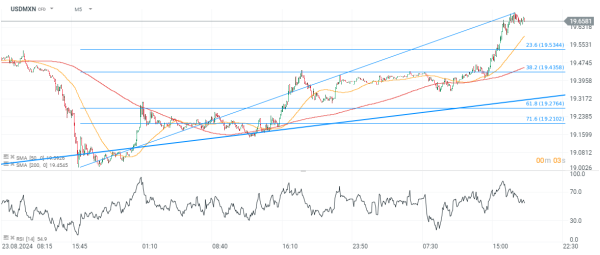Mexican peso drops amid political uncertainty
The index of emerging market currencies from South and Central America is taking a significant hit today, with the Mexican peso leading the declines. The drop in the MXN to three-week lows is driven by a judicial reform that is increasing political uncertainty in the country, just a month before the new Congress takes office.
- The reform, which originated in February, calls for the election of more than 7,000 judges, including those from the Supreme Court, which the markets perceive as creating a politically uncertain landscape during the term of the outgoing president, López. Investors are concerned about the reform's impact on the country's overall political landscape; democratic movements have suggested that lawmakers should be elected in general elections, not 'appointed' by the authorities. On the other hand, the Bank of Mexico and data on international trade are cushioning the peso's decline
- Recently, Morgan Stanley recommended that clients avoid investing in Mexican assets to steer clear of political risk, which could affect the currency, trade, and business valuations in the country. In a Monday interview, the Governor of the Bank of Mexico, Galia Borja, suggested that the rate cuts in March and August do not indicate a change in the current restrictive monetary policy but are merely adjustments to current realities. This raised questions about future easing, which initially supported the MXN
- The prospect of Canada imposing 100% tariffs on cars from China and 25% on steel imports could support the peso and Mexico's economy. The country is the primary 'intermediary' producer and supplier of Chinese electric vehicles after China and has a free trade agreement with Canada and the USA
 Source: xStation5
Source: xStation5